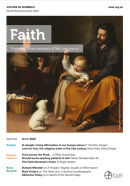Should we be Assisting Patients to Die?
There have been seven attempts in Parliament to change the law on assisted suicide in the last twenty years or so. Each time, the proposed change in favour of physician-assisted suicide has been decisively defeated, but the issue keeps returning. I cannot think of any other piece of legislation which would be given so much parliamentary time in spite of such repeated rejection by Parliament. One has to ask why.
Behind these attempts to change the law stands the dominant belief in personal autonomy: Everyone has the right to make decisions about their own bodies and this, say the proponents of change, should extend to the right to end one’s life at a time and manner of one’s own choosing. Although the Meacher Bill, like some of its predecessors, restricts the provision of assisted suicide to those diagnosed with a terminal illness and where the prognosis is for death to ensue in six months or less, the doctrine of autonomy and the belief that there is a ‘human right’ to end my life in the way I choose, will inevitably lead to an extension of assisted suicide for other reasons as well. Indeed, in some jurisdictions like Holland and Belgium, this is precisely what has happened. Several cases have been reported of physician-assisted suicide for conditions like depression, failed gender reassignment, the onset of blindness and even autism! More worryingly, a significant number of physician-assisted deaths, in countries like Belgium, have occurred without consent from the patient! This is the state replacing autonomy and judging which lives are worth living and determining for which resources should be allocated.
A burden?
In several areas where assisted dying is permitted, such as Oregon and Washington State in the US and in Canada, increasing numbers of elderly and vulnerable patients are choosing assisted dying because of the fear of being a burden on family and carers. In such cases, the ‘right to die’ is rapidly transmuting into the ‘duty to die’ to relieve the spouse, the family or even the state of having to care for the person who is ill.
There are difficulties also with the terminology that is used. What is a ‘terminal’ illness and how accurate are the prognoses? There is medical evidence that predictions for certain diseases can be wrong and we all know of cases where people have survived for much longer than their prognosis stated sometimes for years! Depending on our point of view, we can call this ‘remission’ or a miracle. Even if death is to occur within a short period, that is not a reason to hasten it prematurely. The Christian-inspired hospice movement has led the way in showing us how, with good palliative care, counselling and spiritual assistance, ‘last days’ needn’t be ‘lost days’. They can be vital in preparing for a good death, in ‘mending fences’ with relatives, colleagues and friends and in spending quality time with the family. In most cases, pain can be relieved and, in others, made bearable. If all else fails, there is sedation where the intention is not to kill but to relieve pain, even if death results because of it.
There are serious concerns that assisted dying laws do not adequately protect those with mental illness or personality disorders and that many physicians do not know how to deal with depression in those who have been diagnosed as terminally ill. There is also evidence that the provision of physician-assisted suicide has a deleterious effect on society’s programmes for suicide prevention more generally.
At its recent meeting of representatives, the British Medical Association has changed its position from opposition to physician-assisted suicide to one of ‘neutrality’ in the debate. We can ask whether this is, in fact, a signal towards greater acceptance of the practice and how this can be so, given the World Medical Association’s strong opposition to the practice, reiterated as recently as 2019. Both the classical and modern forms of the Hippocratic Oath (the latter in the form of the Geneva Declaration), moreover, require physicians to value and preserve human life, not to destroy it. The participation of doctors in suicide or euthanasia is bound to affect the doctor-patient relationship and will, undoubtedly, undermine the trust that patients have in doctors regarding the standard of care they may expect. This will be particularly true when assisted dying is extended to chronic or mental illness or to disability of one kind or another. There may well be concern whether the availability of physician-assisted dying is first about patient welfare or whether it is about the resources of the health system.
Worried
Evidence from the US and Canada shows that doctors are worried about their mental health if they participate in physician-assisted dying. In Britain, the BMA’s own survey shows that a majority of doctors, who expressed an opinion, were unwilling to prescribe lethal drugs to patients. There is similar evidence from the BeneLux countries (Belgium, the Netherlands, and Luxembourg). This is often due to doctors’ concern about their own mental health.
There are, of course, religious reasons for opposing assisted dying. These have to do, for example, with the Judaeo-Christian teaching that we are made in God’s image and that this confers inalienable dignity on us which is inviolable, except in strictly specified conditions such as a just war. Religion also emphasises our interdependence rather than radical autonomy and the signals given to society which may endanger the weak and vulnerable. More recently, however, Lord Carey, the former Archbishop of Canterbury, Rabbi Jonathan Romaine and Archbishop Desmond Tutu have argued, in an article in the British Medical Journal, that the Jewish and Christian Scriptures do not prohibit assisted suicide and that it may be part of our religious obligation to help people to die when they wish to do so because of unbearable pain or indignity because of loss of control over bodily function or even ‘discomfort’.
Intention to kill
Against this, it has to be said that the commandment “You shall not kill” is without qualification and has to be understood as such if there is not to be a slippery slope to a permissive free for all imperilling the person at the earliest and latest stages of life and also the weakest in society whose lives may be thought to be ‘not worth saving’. The killing of the innocent is never sanctioned in any part of the Bible and there is no recognition of the ‘right to die’. Humans belong to their Creator and to each other in family and society. The only instances of alleged killing to relieve someone of terminal suffering are viewed entirely negatively (Judges 9:53-56, 1 Sam 31:3-5 and 2 Sam 1:1-16).
Carey et al argue that humans have already taken over God’s prerogative in creating life in vitro or postponing death through medical intervention so why should they not now take over his prerogative to determine our time of death? Indeed, they contend that it is part of our duty as made in God’s image to ‘play God’ if it helps those in distress. To this we can say that such thinking is very near the hubris of the original sin. It is certainly true that it is part of our duty, as stewards of creation, to relieve unnecessary suffering wherever and whenever we can. It is also the case that medical treatment can be withdrawn if it is not making any difference. The injunction not to kill does not mean trying to keep alive in all circumstances. As they say, there is, indeed, a time to die, but that does not mean actively bringing about someone’s death. Switching off a life support machine when it is not serving any useful purpose and prescribing drugs to bring about death are two quite different actions. In one the intention is not to kill, even if we know that death will result. In the other, the intention is to kill.
Moral tradition
The writers repeatedly claim the support of opinion polls as if that is all that is needed in making moral decisions! As we have tried to show, however, there are weighty religious and philosophical considerations against physician-assisted dying, not to speak of the many medical and social dangers outlined above. No intervention can be convincing in this matter if it does not take moral and spiritual tradition seriously. It has largely been a religious impulse which has brought us highly developed systems of palliative care in the hospice movement. Let us use these to deal with pain and suffering rather than going down the dangerous road of assisted dying.
Fr. Michael Nazir-Ali is a member of the Ordinariate of Our Lady of Walsingham and former Anglican Bishop of Rochester.






